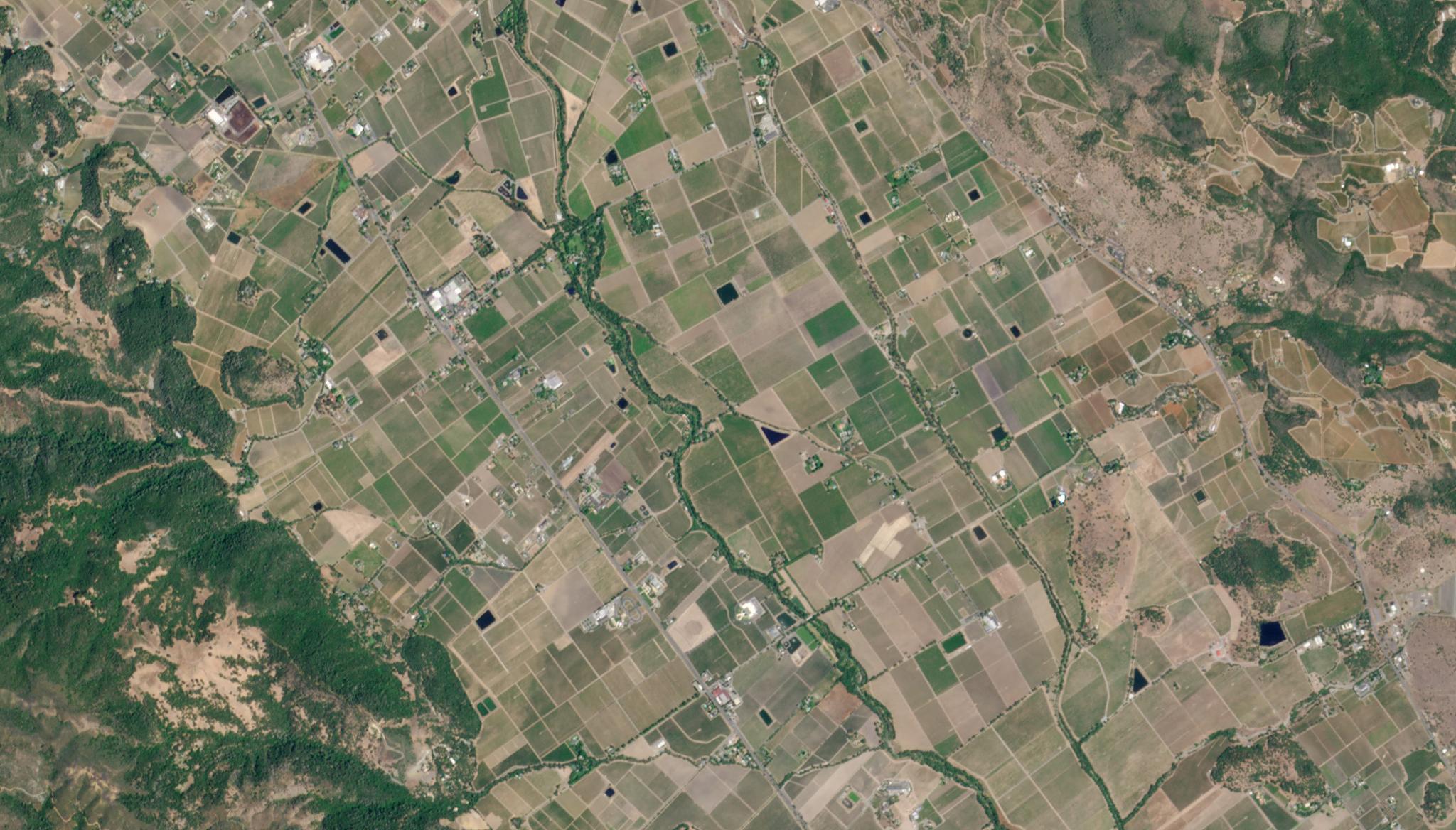Verdi uses Planet data to help farmers save 7 million liters of water while improving crop quality and yield

PlanetScope image of vineyards in Napa, California taken June 19, 2022. © 2022, Planet Labs PBC. All Rights Reserved.
StoriesWater scarcity is on the rise, and it is impacting crop yield around the world. In the US alone, over 378 million acres of farmland are currently under drought. And as climate change is accelerating, agricultural water scarcity is expected to intensify in over 80% of global croplands. Wasteful watering methods must evolve to prepare for future water shortages.
Drip irrigation, invented in the 1950s, continues to be the most advanced irrigation system available. Unfortunately, although it’s significantly better than flood irrigation or sprinkler systems, it continues to waste water input. According to Arthur Chen, CEO & Co-founder of Verdi, that’s because it’s a spray-and-pray approach that pours water on every plant without targeting its individual needs. But soil is variable, and growers shouldn’t treat entire fields the same way.
Verdi has built a smart system to help. Verdi’s platform augments legacy irrigation infrastructure with capabilities for automation and plant-level healthcare, bringing variable rate irrigation to specialty crops. This allows farmers to radically improve productivity and reduce water risk. With some of the world's largest food and beverage brands as clients, it’s working in a big way: Verdi is on track to save over 7 million liters of water in 2022 and expects that to grow to 20 billion liters of water saved every year by 2027.
We talked to Chen to get the story behind this mission-driven company and find out what led Verdi to partner with Planet. Considering that Verdi’s founders all come from families with roots in agriculture there was an obvious passion for the industry. Chen shared, “It's an opportunity to make agriculture much more sustainable and to future-proof what our families have been doing for generations.”
Observation before action
Verdi’s solution starts with Earth observation from Planet. Its software analyzes Planet data to get a baseline understanding of the crops. This allows Verdi to show farmers which areas of the field are underperforming, which are performing well, and which areas have excessive growth that can lead to a reduction in quality. “We often hear from the grower, ‘Hey. That is a problem area, and it's cool that I can see it now,’” Chen said. “It really helps to build that trust with the growers.”
Chen maintains that Planet imagery is the key to pinpointing what’s happening on the land. “We looked at a number of different providers and ultimately decided to partner with Planet for several reasons,” he explained. “Other satellite sources are out there, but they are too low-resolution and only take images once every week or two. You can get a sense of what's wrong, but it's not very granular. With Planet imagery, we get three-meter resolution and 4-band images daily, plus historical data. And from an integration standpoint, the Planet API is simple to use.”
The granular information Verdi gets from Planet lets them identify areas of inefficiency and prescribe a management strategy, something they could not do before using Planet data. “We can also monitor changes throughout the season to ensure things are tracking in the right direction with NDVI [Normalized Difference Vegetation Index] or whatever metric we’re using, ” Chen shared.
Action leads to better quality crops, increased yields, and labor, water, and fertilizer savings
By being a lot more efficient with how farmers allocate their water, Chen sees that customers not only save on the resources they're putting in, but also get a much better crop yield and quality.
One of Canada’s largest wine companies started working with Verdi in 2020. After performing prescriptive analysis using Planet imagery, they retrofitted smart devices into the field—precisely where they were called for—to control water and fertilizer at a more granular scale.
The results? A single season of these field automations increased yield in underperforming areas and balanced over-vegetated areas, leading to better fruit quality. The effective yield per acre increased by 8%, resulting in approximately $7,500 more per acre.
Other customers have seen measurable savings in labor, to the tune of 20-40 hours per week, per acre. Though fiscally water is still relatively inexpensive in many areas, Verdi cuts costs there too. In drought-prone regions, growers see up to 50% or 60% in water savings.
20 billion liters of water savings annually and beyond
With the success Verdi has seen so far, Chen is confident they’ll meet their north star goal to save billions of liters of water each year within five years.
They also plan to broaden their use cases with Planet. The company’s mission is to help farmers adapt to climate change, empowering them to become resilient to more than just drought. “Right now, we're using the near-infrared data for vegetation indices. We only use four-band imagery and want to start using eight bands. We’re looking at how we can bring in additional indices that can be useful for our customers.” Planet 8-band imagery provides insights across the visible and invisible spectrum, to allow for deeper understanding and more accurate decision making.
“Planet is freeing us to be a lot more scalable than a typical hardtech company in agriculture would be,” Chen said. “We can go to any farm, any customer, and show them what's wrong with their crops and recommend treatments. Planet is going to continue to be a major partner in helping us scale to hundreds of thousands of acres and billions of liters of water saved.”

Ready to Get Started
Connect with a member of our Sales team. We'll help you find the right products and pricing for your needs

